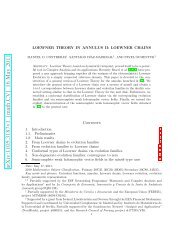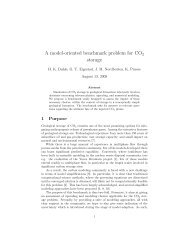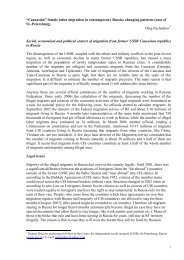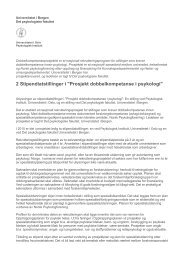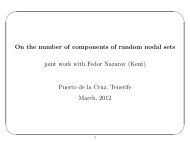Experiential metaphors in Latin - Wiley Online Library
Experiential metaphors in Latin - Wiley Online Library
Experiential metaphors in Latin - Wiley Online Library
Create successful ePaper yourself
Turn your PDF publications into a flip-book with our unique Google optimized e-Paper software.
318<br />
TRANSACTIONS OF THE PHILOLOGICAL SOCIETY 109, 2011<br />
‘temperature’ and aegritudo ‘sickness, distress’). In addition, anger, psychological <strong>in</strong>sanity and<br />
madness may be conceived of as mental diseases, which alter one’s cognitive skills and make<br />
one (mentally) ill. It is worth not<strong>in</strong>g that this schema constitutes a specific <strong>in</strong>stantiation of the<br />
orientational metaphor BAD IS DOWN (Lakoff & Johnson 1980): all the stimuli are oriented<br />
towards a negative pole, and one can fall only <strong>in</strong>to bad states ⁄ conta<strong>in</strong>ers. 5<br />
This metaphor is quite productive: it gave rise to novel forms which are basically extensions<br />
of the orig<strong>in</strong>al conceptual association. This fact can be regarded as a semantic specialization<br />
process; notably, the six constructions share the semantic common ground of describ<strong>in</strong>g an<br />
entrance <strong>in</strong>to a state of mental or physical damage as if it were a fall <strong>in</strong>to a bounded area or,<br />
rather, <strong>in</strong>to a conta<strong>in</strong>er, as the follow<strong>in</strong>g examples show:<br />
(14) Nam mihi et scriptum et nuntiatum est te <strong>in</strong> febrim<br />
<strong>in</strong>deed I.DAT and written.PP and foretold.PP is you.ACC <strong>in</strong> fever.ACC<br />
subito <strong>in</strong>cidisse<br />
suddenly fell.INF.PERF.<br />
‘for I have been told both by letter and word of mouth that you have suddenly fallen<br />
<strong>in</strong>to a fever’ (Cicero, Ep. ad Fam. 14, 8, 1)<br />
(15) <strong>in</strong> morbum gravem periculosumque <strong>in</strong>cidit<br />
<strong>in</strong> disease.ACC serious.ACC dangerous.ACC-and fell<br />
‘(he) fell seriously and dangerously ill’ (Cicero, Pro Cluentio par. 198)<br />
Interest<strong>in</strong>gly, with the filler aegritudo both schemas are allowed: the stimulus can be realized<br />
both as a conta<strong>in</strong>er, as <strong>in</strong> sentence (16a), and as a fall<strong>in</strong>g subject hitt<strong>in</strong>g someone on the head,<br />
as <strong>in</strong> sentence (16b) (this pattern occurs eight times <strong>in</strong> Cicero, and once <strong>in</strong> Seneca, with a<br />
slightly different mean<strong>in</strong>g, i.e. ‘to apply to’, ‘to be predicable of ’):<br />
(16) a. si sapiens <strong>in</strong> aegritud<strong>in</strong>em <strong>in</strong>cidere posse<br />
if wise.NOM <strong>in</strong> distress.ACC fall.INF can.INF<br />
‘if the wise man could be capable of fall<strong>in</strong>g <strong>in</strong>to distress’ (Cicero, Tusc. 3.9.20)<br />
b. non cadet ergo <strong>in</strong> sapientem aegritudo<br />
not applies.FUT thus <strong>in</strong> wise.ACC distress.NOM<br />
‘thus the wise man will not be susceptible of distress’ (Cicero, Tusc. 3.7.14)<br />
A similar construction, <strong>in</strong> which the stimulus is conceptualized as an object fall<strong>in</strong>g onto the<br />
Experiencer, is also attested twice <strong>in</strong> Terence and once <strong>in</strong> Cicero: aliquid mihi <strong>in</strong>cidit <strong>in</strong><br />
mentem ‘someth<strong>in</strong>g falls <strong>in</strong>to my m<strong>in</strong>d’, probably an alternative lexical variant of the most<br />
frequently attested construction, aliquid mihi <strong>in</strong> mentem venit ‘someth<strong>in</strong>g comes to my<br />
m<strong>in</strong>d’:<br />
(17) a. mihi venit <strong>in</strong> mentem M. Catonis<br />
I.DAT came <strong>in</strong> m<strong>in</strong>d.ACC M. Cato<br />
‘M. Cato came <strong>in</strong>to my m<strong>in</strong>d’ (lit. ‘to me came <strong>in</strong> m<strong>in</strong>d of M.C.’)<br />
Cicero, In Verrem 2. 6.180)<br />
5 This generalisation my seem too strong at first glance. Doubters might claim e.g. that <strong>in</strong> English neutral or positive<br />
‘fall<strong>in</strong>g’ <strong>metaphors</strong> are also attested: beside fall<strong>in</strong>g ill one can also fall asleep or even fall <strong>in</strong> love. However, such<br />
<strong>in</strong>stances can be understood <strong>in</strong> the light of the RATIONAL IS UP; EMOTIONAL IS DOWN schema, derived from the more<br />
general image CONTROL IS UP (and UNCONTROLLED IS DOWN; see Lakoff & Johnson 1980: 17).











